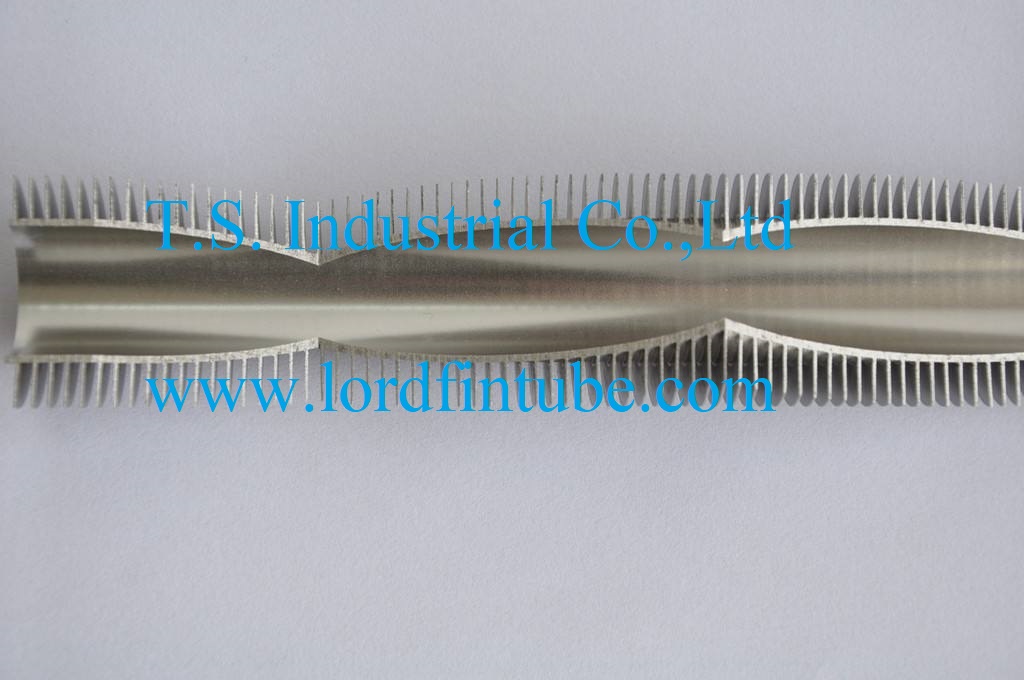Lord Fin Tube-Laser welding finned tube
Laser Welded Finned Tubes
Our company has taken a significant leap in the field of heat exchange technology with the introduction and independent development of stainless steel laser-welded finned tubes. This cutting-edge product has revolutionized the industry by incorporating complete automation and mechanization into the welding process. The laser welding technique ensures a penetration depth of ≤ 0.2mm, leading to a substantial improvement in the heat transfer coefficient.
Laser Welded Finned Tubes Process
The technological superiority of our stainless steel laser-welded finned tubes surpasses that of traditional high-frequency welded fin tubes. The elimination of wrinkles, easy cleaning, and a remarkable reduction in material usage make it an upgraded and more efficient alternative. With a high welding rate and suitability for frequent cold and heat exchange, our product stands out as a reliable choice for diverse applications.
Precision Welding
Laser welding ensures a penetration depth of ≤ 0.2mm, significantly enhancing the heat transfer coefficient compared to traditional methods.
Enhanced Heat Dissipation
With fin distance capabilities of ≤ 1.8mm, our tubes provide a heat dissipation area more than 50% greater than traditional high-frequency welded fin tubes.
Material Efficiency
Fin thickness of ≤ 0.5mm achieves over 50% reduction in material usage while maintaining structural integrity and performance.

Advantages of Laser Welded Finned Tubes
Performance Metrics
Technical Features
- Advanced Welding Technology: The laser welding process ensures precision and efficiency, resulting in a penetration depth of ≤ 0.2mm. This significantly enhances the heat transfer coefficient compared to traditional high-frequency welded fin tubes.
- Increased Heat Dissipation Area: The fin distance can be ≤ 1.8mm, leading to a heat dissipation area more than 50% greater than that of traditional high-frequency welded fin tubes. This contributes to improved thermal performance.
- Material Efficiency: With a fin thickness of ≤ 0.5mm, our finned tubes achieve over 50% reduction in material usage compared to traditional counterparts. This not only saves costs but also enhances product quality.
- Compact Design: The reduced volume of combined equipment by two-thirds allows for more efficient and space-saving installations.
- Stability and Reliability: The laser welding finned tube is a mature and stable product with proven technology. Its stable performance ensures reliability in various working conditions.
- Versatility in Processing: Different materials can be used for processing, providing flexibility in meeting diverse application requirements.
- Ease of Secondary Processing: The product allows for easy secondary processing, including coiling and bending, offering versatility in design and application.
- Small Heat-Affected Zone: The welding heat-affected zone is minimal, enabling the processing of small-diameter finned tubes. This, in turn, opens up possibilities for a wider range of applications.
Comparison: Laser Welding vs Traditional Methods
| Parameter | Laser Welded Finned Tubes | High-Frequency Welded | Embedded Finned Tubes |
|---|---|---|---|
| Thermal Resistance | Near-zero contact thermal resistance | Moderate contact resistance | Higher contact resistance |
| Structural Integrity | Full penetration welding, no loosening | Potential root unwelding | Mechanical fixation only |
| Material Economy | Base tube: 0.8-1.5mm, Fin: 0.3-1.0mm | Thicker materials required | Limited material options |
| Processing Flexibility | Excellent secondary processability | Limited bendability | Poor reformability |
| Anti-fouling Performance | Smooth transition, minimal fouling | Prone to ash accumulation | Gap accumulation issues |
| Service Life | 30-50% longer than alternatives | Standard lifespan | Shorter service life |
| Heat Transfer Efficiency | Excellent (near-zero contact resistance) | Good | Moderate |
Laser Welded Finned Tubes Material Specifications
Our stainless steel finned tubes, primarily crafted from high-quality 304 stainless steel, find extensive use in heat exchange applications across industries. The product excels in waste heat recovery and utilization, contributing to improved efficiency, extended product life, and significant material savings.
Base Tube Materials
- Carbon steel (ASTM A179, A192)
- Stainless steel (304, 316, 321)
- Copper (C12200, C14200)
- Titanium alloys (Grade 1, 2)
- Duplex stainless steels
Fin Materials
- Carbon steel
- Stainless steel (304, 316L)
- Aluminum (1100, 3003)
- Copper
- Special alloys
Design Variations
- Spiral finned tubes
- Longitudinal finned tubes
- Segmented finned tubes
- Studded finned tubes
- Custom geometries
The integral rolled fin tube design ensures no contact thermal resistance, exceptional heat transfer performance, high strength, heat resistance, and mechanical stability even in the face of vibrations.
Laser Welded Finned Tubes Applications
Heat Recovery Systems
Waste heat boilers, economizers, air preheaters in power generation and industrial plants for maximum energy efficiency.
Process Industries
Heat exchangers in petrochemical, refining, and chemical processing equipment requiring corrosion resistance.
HVAC & Refrigeration
Commercial building heating systems, chillers, and refrigeration units for optimal thermal performance.
Power Generation
Boilers, condensers, and feedwater heaters in thermal and nuclear power plants.
Marine Applications
Heat exchangers for ship engines, desalination units, and other marine thermal systems.
Renewable Energy
Solar thermal systems, geothermal heat exchange applications, and biomass energy plants.
Laser Welded Finned Tubes Manufacturing
With six sets of advanced laser welding machines and an impressive annual production capacity of 500,000 meters, we are committed to providing innovative and reliable solutions to meet the evolving needs of our customers across various industries.
Laser Welded Finned Tubes Quality Assurance
Our manufacturing process includes rigorous quality control measures:
- Visual inspection of welds
- Penetration testing
- Pressure testing
- Dimensional verification
- Material certification

